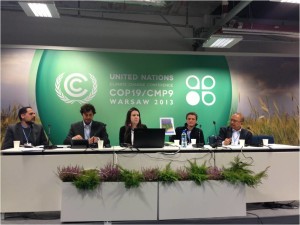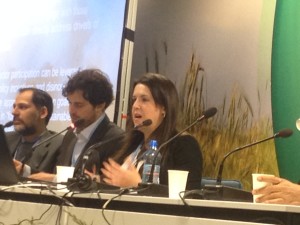We have much more to do and your continued support is needed now more than ever.
COP 19 Report: NWF’s Partnerships for Forest Protection
Greetings from Poland! NWF staff have been circling the National Stadium, speaking with government negotiators, civil society and the private sector. Yesterday was our opportunity to present the work we’ve been doing on partnerships between the public and private sectors to protect tropical forests while scaling-up sustainable agriculture. Protecting these forests not only preserves habitats in some of the most species-rich places on Earth, but also works to mitigate climate change that has disastrous effects on wildlife and people the world over.
Our official side event, “Innovative public-private partnership approaches to support REDD+ goals,” outlined a number of ways that governments are working with multinational corporations to “green” their supply chains, and also identified opportunities to continue towards sustainability and reducing deforestation.

Building Sustainable Partnerships
NWF and our partners have developed innovative partnerships to strengthen incentives to reach this goal in Brazil and Indonesia. The side event panelists included Eduardo Bastos, President of the Brazilian Roundtable on Sustainable Livestock (GTPS), Michael Obersteiner, an esteemed land-use researcher at the International Institute for Applied Systems Analysis (IIASA) in Vienna, Pak Heru Prasetyo, Indonesian President’s Delivery Unit for Development Monitoring and Oversight, and NWF’s own Nathalie Walker, Senior Manager of the Tropical Forest & Agriculture Project. Niki Mardas from the Global Canopy Programme (GCP) served as the panel’s moderator.

Walker traced the history and success of the soy moratorium in Brazil that has essentially halted deforestation driven by soy production—an excellent example of private sector initiative and government monitoring. She also introduced a new report written by NWF and GCP – Tools to Address the Drivers of Deforestation through Public and Private Sector Synergies. Finally, Pak Heru Prasetyo provided a public official’s perspective on the great importance of partnerships between the public and private sectors, and stressed the need for innovation in how the private sector engages and promotes REDD+. He ended by emphasizing that, “Investment that is low emission can produce the equity, growth, and sustainability that is needed.”





















